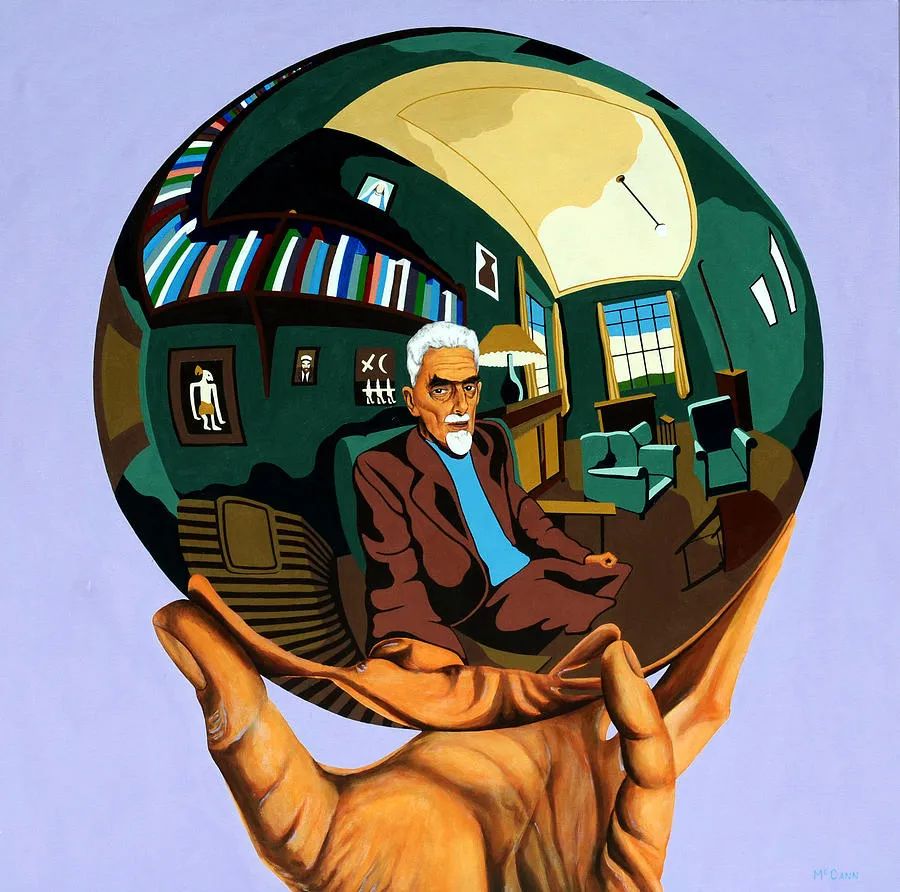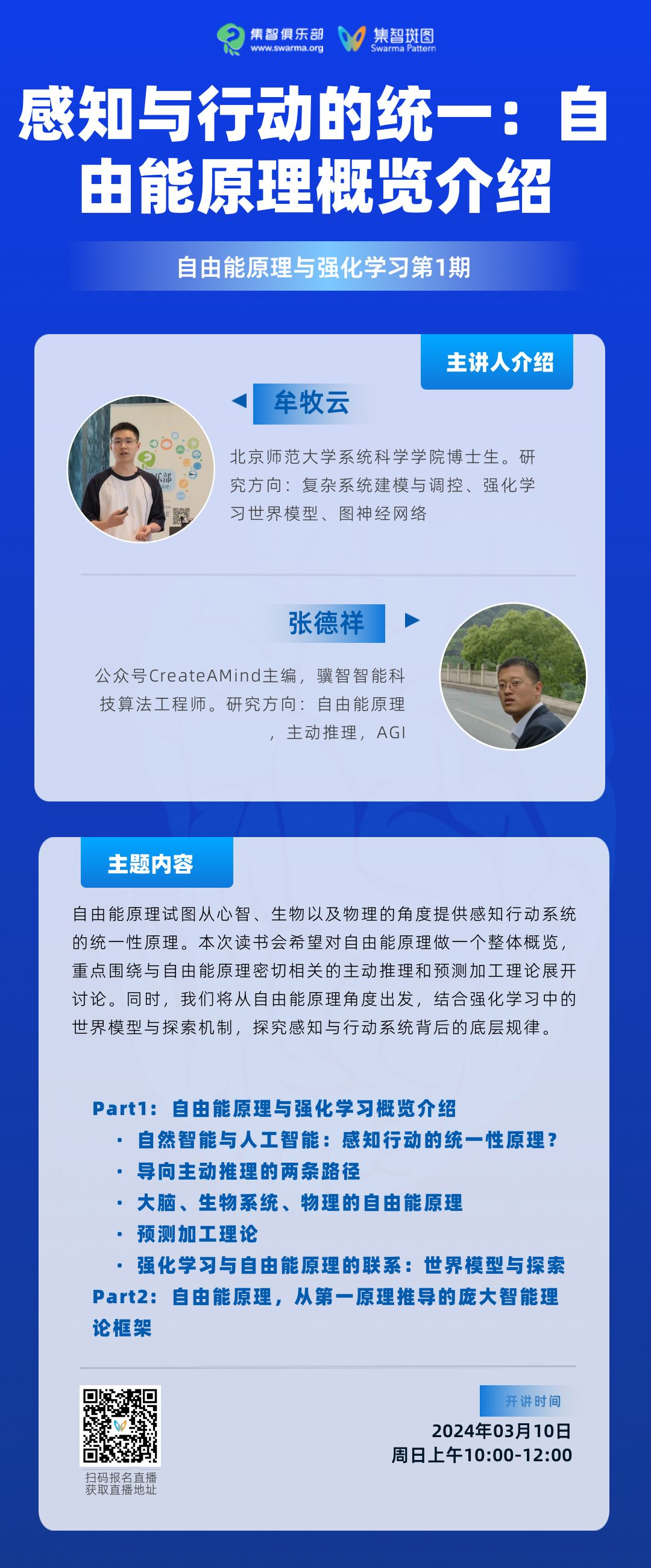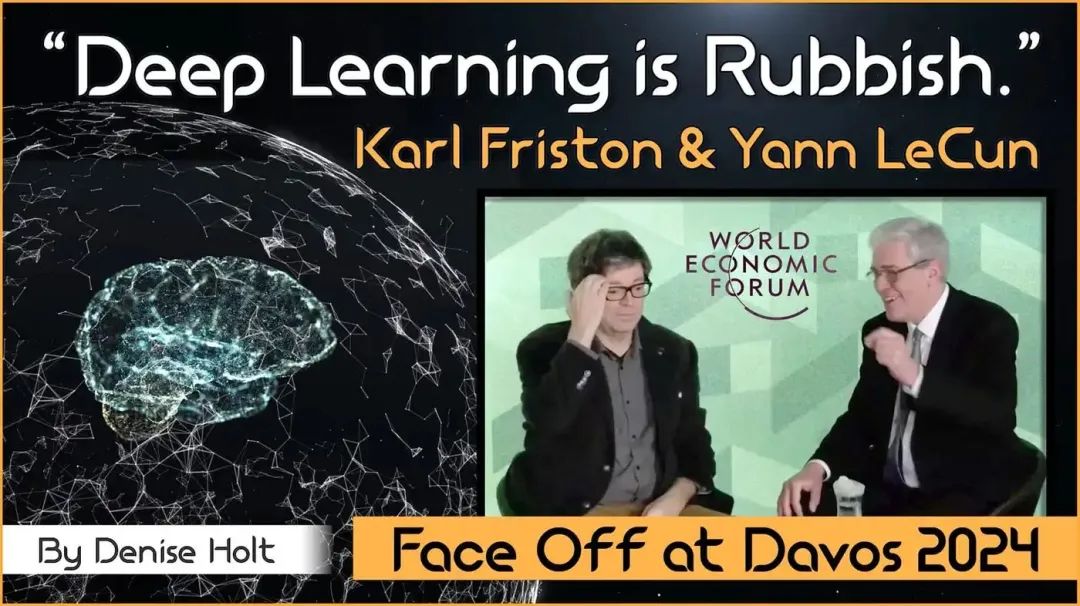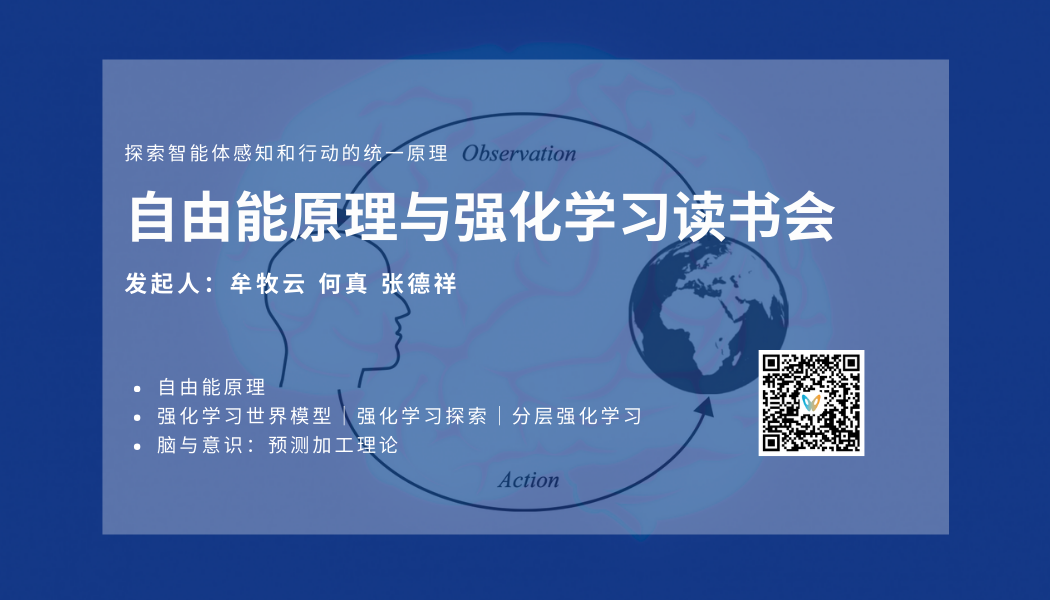
导语


分享内容简介
分享内容简介
—— 自由能原理提出者 Karl Friston
 参考链接:https://medium.com/aimonks/deep-learning-is-rubbish-karl-friston-yann-lecun-face-off-at-davos-2024-world-economic-forum-494e82089d22
参考链接:https://medium.com/aimonks/deep-learning-is-rubbish-karl-friston-yann-lecun-face-off-at-davos-2024-world-economic-forum-494e82089d22
内容大纲
内容大纲
牟牧云:自由能原理与强化学习概览介绍
自然智能与人工智能:感知和行动的统一性原理?
导向主动推理的两条路径
大脑、生物系统、物理的自由能原理
预测加工理论
强化学习与自由能原理的联系:世界模型与探索
张德祥:自由能原理——从第一原理推导的庞大智能理论框架
自由能原理定义
类生物AGI实现进展简介
基础
自由能原理与相关的各个理论比较
自组织方向 目的 high road
⻉叶斯方向 机制 low road
自由能原理的世界模型层次观
核心概念
核心概念
自由能原理 Free Energy Principle
主动推理 Active inference
强化学习 Reinforcement learning
世界模型 World model
预测加工理论 Predictive processing theory
主讲人简介
主讲人简介


直播信息
直播信息

参考文献
参考文献
Parr, Thomas, Giovanni Pezzulo, and Karl J. Friston. Active inference: the free energy principle in mind, brain, and behavior. MIT Press, 2022.
Friston, K. The free-energy principle: a unified brain theory?. Nat Rev Neurosci 11, 127–138 (2010). https://doi.org/10.1038/nrn2787
Friston, Karl, James Kilner, and Lee Harrison. A free energy principle for the brain. Journal of physiology-Paris 100.1-3 (2006): 70-87.
Karl, Friston. A free energy principle for biological systems. Entropy 14.11 (2012): 2100-2121.
Friston, Karl. A free energy principle for a particular physics. arXiv preprint arXiv:1906.10184 (2019).
Parr, Thomas, and Karl J. Friston. Attention or salience?. Current opinion in psychology 29 (2019): 1-5.
Feldman, Harriet, and Karl J. Friston. Attention, uncertainty, and free-energy. Frontiers in human neuroscience 4 (2010): 215.
Clark, Andy, Surfing Uncertainty: Prediction, Action, and the Embodied Mind (New York, 2016; online edn, Oxford Academic, 22 Oct. 2015), https://doi.org/10.1093/acprof:oso/9780190217013.001.0001, accessed 19 Dec. 2023. (中译本《预测算法:具身智能如何应对不确定性》,机械工业出版社(2020))
Blakemore, Sarah-J., Chris D. Frith, and Daniel M. Wolpert. Spatio-temporal prediction modulates the perception of self-produced stimuli. Journal of cognitive neuroscience 11.5 (1999): 551-559.
Mazzaglia, Pietro, et al. The free energy principle for perception and action: A deep learning perspective. Entropy 24.2 (2022): 301.
Hafner D, Lillicrap T, Fischer I, et al. Learning latent dynamics for planning from pixels. ICML 2019
【Dreamer V1】Hafner D, Lillicrap T, Ba J, et al. Dream to control: Learning behaviors by latent imagination[J]. arXiv preprint arXiv:1912.01603, 2019.
【Dreamer V2】Hafner D, Lillicrap T, Norouzi M, et al. Mastering atari with discrete world models[J]. arXiv preprint arXiv:2010.02193, 2020.
【Dreamer V3】Hafner D, Pasukonis J, Ba J, et al. Mastering diverse domains through world models[J]. arXiv preprint arXiv:2301.04104, 2023.
Hao J, Yang T, Tang H, et al. Exploration in deep reinforcement learning: From single-agent to multiagent domain. IEEE Transactions on Neural Networks and Learning Systems, 2023.
Sekar R, Rybkin O, Daniilidis K, et al. Planning to explore via self-supervised world models. ICML 2020
Saxena V, Ba J, Hafner D. Clockwork variational autoencoders. NIPS 2021, 34: 29246-29257.
读书会阅读材料较多,为了更好地阅读体验,可扫描下方二维码进入集智斑图页面,阅读并收藏感兴趣的论文。 
https://pattern.swarma.org/article/289
Parr, Thomas, Giovanni Pezzulo, and Karl J. Friston. Active inference: the free energy principle in mind, brain, and behavior. MIT Press, 2022.
Friston, K. The free-energy principle: a unified brain theory?. Nat Rev Neurosci 11, 127–138 (2010). https://doi.org/10.1038/nrn2787
Friston, Karl, James Kilner, and Lee Harrison. A free energy principle for the brain. Journal of physiology-Paris 100.1-3 (2006): 70-87.
Karl, Friston. A free energy principle for biological systems. Entropy 14.11 (2012): 2100-2121.
Friston, Karl. A free energy principle for a particular physics. arXiv preprint arXiv:1906.10184 (2019).
Parr, Thomas, and Karl J. Friston. Attention or salience?. Current opinion in psychology 29 (2019): 1-5.
Feldman, Harriet, and Karl J. Friston. Attention, uncertainty, and free-energy. Frontiers in human neuroscience 4 (2010): 215.
Clark, Andy, Surfing Uncertainty: Prediction, Action, and the Embodied Mind (New York, 2016; online edn, Oxford Academic, 22 Oct. 2015), https://doi.org/10.1093/acprof:oso/9780190217013.001.0001, accessed 19 Dec. 2023. (中译本《预测算法:具身智能如何应对不确定性》,机械工业出版社(2020))
Blakemore, Sarah-J., Chris D. Frith, and Daniel M. Wolpert. Spatio-temporal prediction modulates the perception of self-produced stimuli. Journal of cognitive neuroscience 11.5 (1999): 551-559.
Mazzaglia, Pietro, et al. The free energy principle for perception and action: A deep learning perspective. Entropy 24.2 (2022): 301.
Hafner D, Lillicrap T, Fischer I, et al. Learning latent dynamics for planning from pixels. ICML 2019
【Dreamer V1】Hafner D, Lillicrap T, Ba J, et al. Dream to control: Learning behaviors by latent imagination[J]. arXiv preprint arXiv:1912.01603, 2019.
【Dreamer V2】Hafner D, Lillicrap T, Norouzi M, et al. Mastering atari with discrete world models[J]. arXiv preprint arXiv:2010.02193, 2020.
【Dreamer V3】Hafner D, Pasukonis J, Ba J, et al. Mastering diverse domains through world models[J]. arXiv preprint arXiv:2301.04104, 2023.
Hao J, Yang T, Tang H, et al. Exploration in deep reinforcement learning: From single-agent to multiagent domain. IEEE Transactions on Neural Networks and Learning Systems, 2023.
Sekar R, Rybkin O, Daniilidis K, et al. Planning to explore via self-supervised world models. ICML 2020
Saxena V, Ba J, Hafner D. Clockwork variational autoencoders. NIPS 2021, 34: 29246-29257.

推荐阅读
自由能原理与强化学习读书会招募中

点击“阅读原文”,报名读书会
内容中包含的图片若涉及版权问题,请及时与我们联系删除



评论
沙发等你来抢